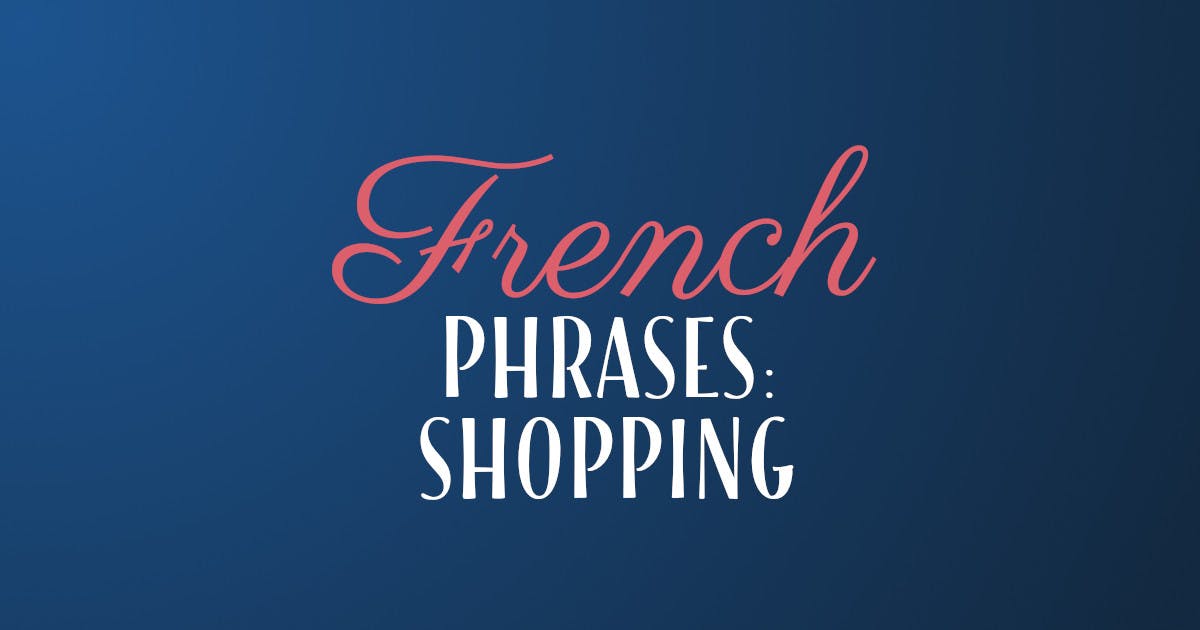Essential French Phrases For Shopping And Paying
When you visit France, you're obviously going to need to know how to use your French to barter.
Whether it's a restaurant meal, souvenirs or any other kind of store, the phrases here are vital to buy and sell.
This is where most people get their most practice in speaking French.
Asking for goods, asking the price, paying for the goods and getting change are a big part of being a visitor to another country.
Greeting shopkeepers in French
The first thing you must do when you go into a shop is to say hello.
There are still many small shops in France and other French speaking countries and when one enters a small shop, one is expected to say hello, even if you do not see the proprietor right away.
In years past, most of these small shops were at the front of the proprietor's residence, so you were stepping into his home, and expected to greet him.
So whenever you enter a shop say hello and address whoever is there: "Bonjour, Madame (Monsieur)." It's nicer still to ask how they are: "Comment ca va?" You can go back to Lesson 4 and look at all of the responses, but in a shop, they will probably reply "Bien, merci, et vous?", to which you can reply "Ca va, merci."
Buying items in French
Let's visit a grocery store (une epicerie) and make some purchases (des achats).
"Est-ce que vous avez du beurre?"
Do you have any butter?
"Oui, bien sur."
Yes, of course.
"_Alors, une plaquette de beurre.
Est-ce que vous avez du fromage italien?_"
A package of butter, then.
Do you have any Italian cheese?"
"Oui, du parmesan."
Yes, Parmesan.
"Je prends un kilo."
I'll take a kilo.
"Est-ce vous avez du fromage francais?"
Do you have any French cheese?
"Madame, j'ai cinquante types de fromage francais!"
Madame, I have fifty types of French cheese!
Idioms, fillers and grammar
We are introduced to a few more idioms, and we'll discuss another grammar rule.
(We're trying to sneak them in painlessly.) "Bien sur" literally means "well sure", but is used to mean "of course." "Alors" is a great all purpose word, and is frequently used as a filler.
It can mean so, well, in that case, then.
It can mean nothing whatsoever and just give you an opening to say something.
You will frequently hear "Alors, au revoir", since it sounds so harsh to just say goodbye.
You may have noticed that the adjective describing a noun follows the noun, unlike in English.
We talked about grey hair (les cheveux gris) and blue eyes (les yeux bleus).
Most of the time, the adjective that describes a noun follows the noun, and must agree with it.
This is why you will have "les yeux bleus"; since eyes is plural, the adjective "blue" must also be plural.
But if you were wearing a blue sweater, you would say "Je porte un pull bleu." The exceptions are adjectives of size: "La grande maison", la petite fille." Now let's practice shopping.
We are going to use a tense that you won't use a lot at this stage of your French education.
It is the subjunctive, and it is used to say "would".
Just memorize the expression, because it is the polite way to ask for something.
We would rather hear "I would like" than "I want", wouldn't we?
"Bonjour, Madame, j'aimerais un pull bleu".
Hello, Madame, I would like a blue sweater.
Practice asking for some other items on your shopping list.
| I'd like | Item | Adjective | English |
|---|---|---|---|
| J'aimerais | Une robe | rouge | A red dress |
| Une veste | noire | A black jacket | |
| Des chaussures | bruins | Brown shoes | |
| Un chemisier | blanc | A white blouse | |
| Une jupe | blanche | A white skirt |
As you know, the adjective has to agree with the noun.
That is why "bruins" is spelled with an "s".
Most of the time, it does not change the pronunciation, since the "s" is not pronounced.
There are some adjectives that change their form when they change from masculine to feminine and, as you can see above, "white" is one of them.
The masculine form "blanc" is pronounced "blong", but when you change it to feminine, the word becomes "blanche".
When you consult your French English dictionary, it will show you both forms of an adjective, so you just have to use the right one with the noun you are describing.
| English | French Phrases |
|---|---|
| How much does this cost? | Combien cela coute t-il |
| Can I pay with a credit card? | Puis-je payer avec la carte de credit? |
| I don’t want it anymore. | Je n’en veux plus |
| Can you lower the price? | Pouvez vous baisser le prix |
| I am not interested. | Je ne suis pas interesse |
| The bill, please. | L’addition s’il vous plait |
Summary
Say in French:
- Hello Madame, how are you?
- Do you have any French cheese?
- I'll take two kilos of Camembert.
- Hello, Madame, I would like a red sweater.
- I have a blue skirt, a white blouse and I would like to wear (porter) the "tri-couleur". (Red, white and blue are the colors of the French flag, and they say "le tri-couleur" as Americans would say the "red, white and blue".
- She is wearing a black jacket, a white skirt and a yellow tie.
- The little girl lives (habiter) in a big house.
- The big house is white.
- The big house has a big garden (le jardin).
- There is a red house across the street from the white house.

SUBSCRIBE: